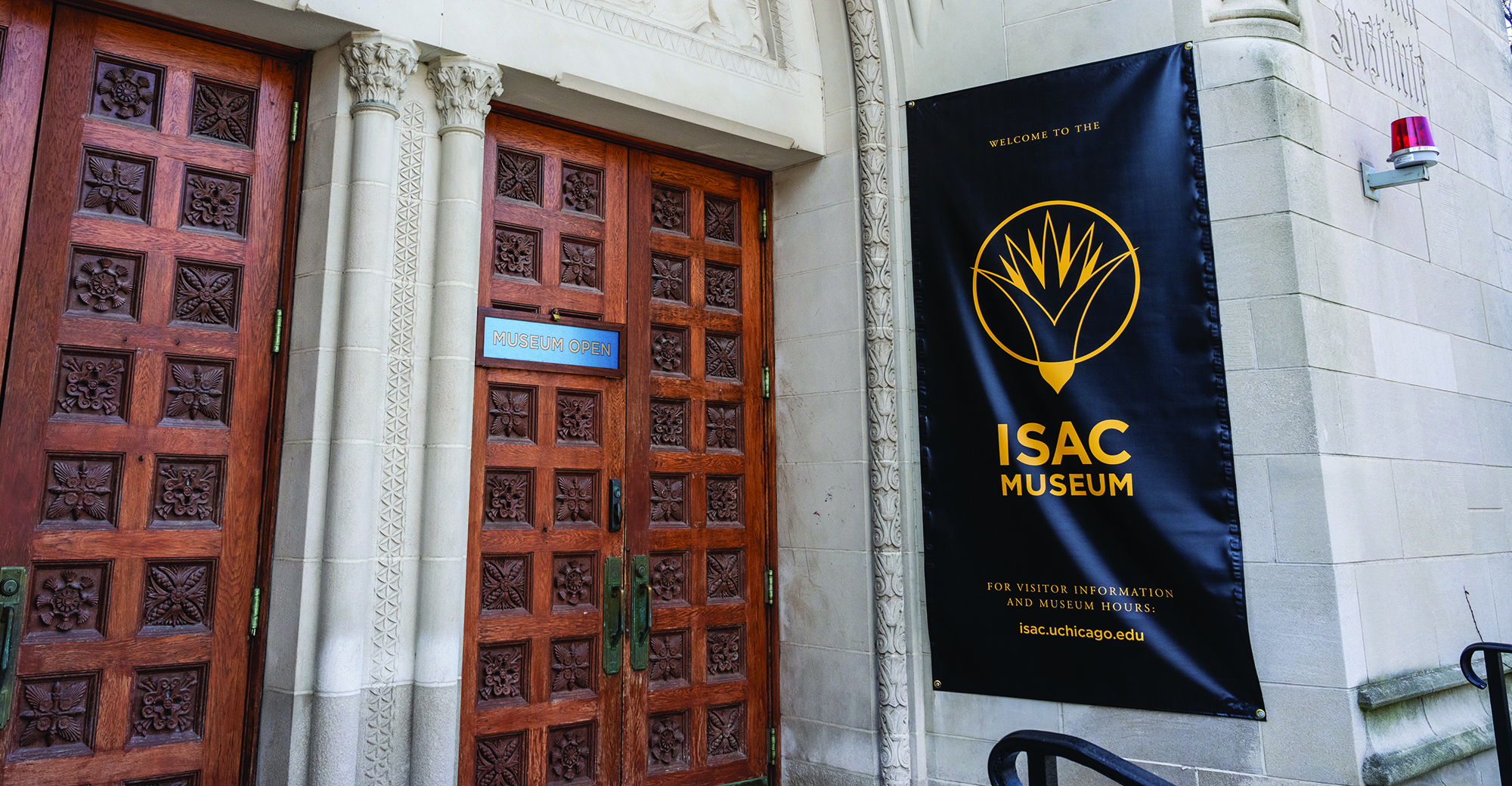
A fresh chapter begins: Following the April 4 reveal of its new name, the Institute for the Study of Ancient Cultures began displaying the moniker and matching logo on updated signage. (Photography by Jason Smith)
The Oriental Institute renames itself, but its mission remains the same.
In April the OI announced it will now be called the Institute for the Study of Ancient Cultures, West Asia and North Africa—a decision that came after a multiyear process with input from faculty, staff, donors, and external scholars. The change, says interim ISAC director Theo van den Hout, opens a new era in the institute’s history by dispensing with a name many found misleading. His comments have been edited and condensed.
How did the decision to change the name come about?
It goes back to my predecessor, Chris Woods, who was director of the OI from 2017 to 2021. He was the one who said in a faculty meeting in June 2020, “I think we should change the name.” There were two main reasons to do so. Most people nowadays, including myself, associate the Orient first and foremost with the Far East—China, Japan, et cetera—which is not at all where we focus. Added to that is the fact that the word oriental has taken on, for many people, a pejorative connotation.
I remember that meeting vividly, because I was surprised that almost everyone immediately said, “You’re right. It’s time to change.” We took a vote, and overwhelmingly, we decided the name should be changed.
What happened from there?
As one of Chris’s last acts as director, and one of my first, we decided we needed a committee to explore all the issues involved. We knew it would be a historic change after, at the time, 101 years of the OI.
The committee was the broadest the OI had ever convened: It included our own faculty, staff, students, members of our advisory council, and faculty from Near Eastern Languages and Civilizations who study Arabic, Turkish, and Persian. It was chaired by one of our Assyriology professors, Hervé Reculeau. He and the committee did a great job.
They canvassed not only our direct constituents but also departments and divisions—such as the Divinity School, classics, art history, anthropology—that we have regular contact with. They asked our international colleagues and peers for suggestions and opinions. They did a detailed inventory of possible objections and advantages and had some suggestions for names. This work culminated in a hefty report.
Tell us about the new name.
We had a few faculty meetings to talk about it and chose “the Institute for the Study of Ancient Cultures, West Asia and North Africa.” For us, West Asia includes Iran, or even farther east. North Africa applies to Egypt, Libya, and Sudan, where we have worked. The name is much more descriptive and accurate.
What are the logistics of the change?
After we decided on the Institute for the Study of Ancient Cultures, West Asia and North Africa, I formed a working group of faculty and staff in communications, IT, and the museum to inventory what would be affected. What issues did we have to think of?
For example, archaeologists were worried about what would happen if they needed a new permit in a country where they already worked—or if they wanted to extend an existing permit and suddenly there was nothing called the OI. So we talked with the Office of Legal Counsel about that risk.
We had to update our website and signage throughout the building and the rest of campus. We also worked with UChicago Creative on a beautiful new logo, polling all sorts of stakeholders to ask what design captured our work best. The ultimate winner involved the lotus flower, and we’re happy with that.
Will the institute’s work change?
It’s the same people working in the same building, and our mission remains the same: promoting knowledge of the history of West Asia and North Africa. This is the University of Chicago, so there is rigorous inquiry within academia, but an important part of our work is informing the wider public through our museum, lectures, and youth and family programming.
What do you hope the new name will make possible?
I hope it will result in attracting a wider audience so that people will immediately know what they’re coming for. We have an amazing collection—the largest collection of Near Eastern antiquities in the country. Yet I fear we are one of those hidden gems in Chicago. It would be nice if we could become more well known, attract more visitors to the museum, and thereby fulfill the second part of our mission—informing the wider public—better. I hope the new name will help make us more recognizable.
What’s been the reaction to the change and the new name so far?
It was pretty unanimous within the halls of this building that it is a good name. When we shared the news publicly in March that we were changing our name, in general, most people said it’s a good thing to do. Some will consider it cancel culture or “woke.” But we think it’s the right thing to do. We are as passionate as ever about what we do and what our mission is. Change can be good, and this is a good change.
